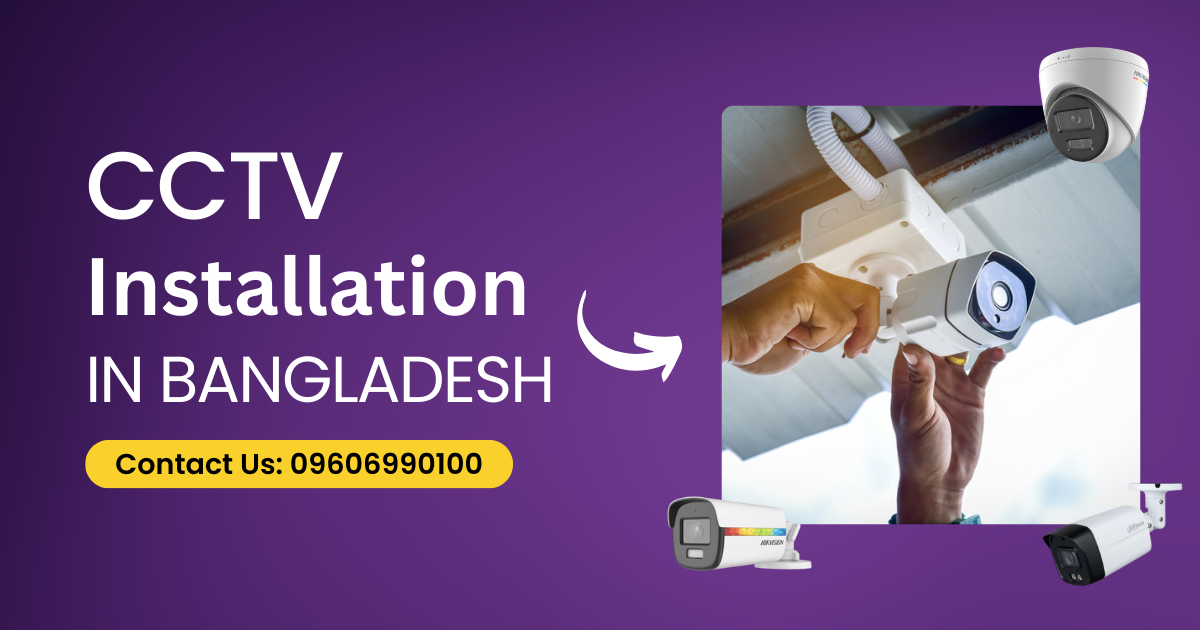CCTV Camera Installation Service in Bangladesh: Comprehensive Guide
Installing a CCTV (Closed Circuit Television) camera system is one of the most effective ways to monitor and protect your property. If you’re in Bangladesh and looking to secure your premises, you can rely on expert CCTV installation services that cover everything from camera selection to seamless installation. In this article, we’ll delve into the details of CCTV camera installation services, including specifications, features, and additional services available in Bangladesh.
Service Overview
Service Type: CCTV Camera Installation
CCTV camera installation services in Bangladesh are provided by various service providers, ensuring that the systems are set up to meet your specific security needs. Expert technicians handle everything from planning the camera placement to connecting the cameras and configuring the system for optimal performance.
Coverage Area
These services are available nationwide across Bangladesh. Whether you’re in a major city like Dhaka or in rural areas, you can find professional CCTV installation services that will cater to your needs.
Installation Team: Expert Technicians
The installation of CCTV cameras requires expertise and precision. The service providers in Bangladesh have a team of highly trained professionals who specialize in installing different types of CCTV systems. The installation team ensures that the cameras are set up properly, with the necessary wiring and configuration to guarantee smooth operation.
Types of CCTV Cameras
Various types of CCTV cameras can be installed, depending on your security needs and preferences. The service providers typically offer a range of camera options, including:
- CCTV Cameras: Standard security cameras that are widely used for surveillance.
- Bullet Cameras: Known for their durability and ability to capture long-range footage.
- Dome Cameras: Discreet and suitable for both indoor and outdoor use.
- PTZ Cameras (Pan, Tilt, Zoom): Offer the flexibility to remotely pan, tilt, and zoom in on specific areas.
- IP Cameras: These are digital cameras that send data via the internet, providing higher quality footage and remote access.
- WiFi Cameras: Wireless cameras that are easy to install and are suitable for places where running wires is difficult.
Key Features of CCTV Camera Installation Services
Expert Technicians
When you opt for professional CCTV installation, you can expect skilled and certified technicians who are capable of handling both the hardware and software aspects of the setup. They ensure the cameras are strategically placed for maximum coverage and minimal blind spots.
Seamless Integration with Existing Systems
If you have other security systems in place (like alarms, intercoms, or access controls), your CCTV system can be integrated into them for more comprehensive security coverage.
High-Quality Camera Compatibility
Whether you’re looking for a traditional CCTV camera or a modern IP-based security solution, the installation service can cater to a wide variety of camera types and brands. This flexibility allows you to choose a system that fits your specific security requirements and budget.
Additional Services
In addition to CCTV camera installation, many providers offer other services, including:
- IP Phone & PBX Systems: For seamless communication within your premises.
- PA & Conference Systems: For audio and visual setups.
- Fire Detection & Alarm Systems: To add an extra layer of safety.
- Networking Solutions: Including setting up routers, switches, and network configurations.
- GPS Tracking: For vehicle and asset tracking.
- RO Water Purifiers: Ensuring the safety of your water supply.
Installation Process
- Initial Consultation: The process begins with a consultation where the technicians assess your property, understand your security concerns, and recommend the best type of camera system.
- System Design and Placement: Based on the assessment, the experts design the layout of the CCTV system, determining the optimal placement for each camera.
- Wiring and Setup: The technicians handle all the necessary wiring and setup, including power supplies and network connections.
- Configuration: After the physical installation, the cameras are configured, connected to your monitoring devices (like smartphones, PCs, or network video recorders), and tested for proper functionality.
- Training: Once the installation is complete, the team will provide basic training on how to use the system, view live footage, and manage recorded videos.
Why Choose Professional CCTV Installation?
- Expertise: Trained professionals ensure that your CCTV system is installed correctly, saving you time and effort.
- Customization: Tailored solutions to meet your specific needs.
- Reliability: Proper installation guarantees long-term reliability, reducing the risk of system failures.
- Warranty and Support: Many service providers offer warranties and ongoing support to ensure your system continues to function optimally.
Contact Information
For any inquiries or to schedule a CCTV camera installation service in Bangladesh, you can reach out to:
- Phone: 09606990100
- WhatsApp: 01317492019
Frequently Asked Questions (FAQs)
- How much does CCTV installation cost in Bangladesh? The cost depends on factors like the number of cameras, the type of cameras, and the complexity of the installation. Prices typically start around BDT 5,000 and can go up depending on the system you choose.
- Can CCTV cameras be installed on a budget? Yes, budget-friendly options such as Wi-Fi cameras or basic CCTV setups are available for those with limited budgets.
- How long does CCTV installation take? The installation time can vary, but it usually takes between 2-6 hours depending on the number of cameras and the complexity of the setup.
- Can I view my CCTV footage remotely? Yes, many modern CCTV systems allow remote viewing through apps or web portals, which means you can monitor your property from anywhere in the world.
- Is there a warranty on CCTV systems? Most CCTV installation services offer a warranty on cameras and installation services, ensuring that you are covered in case of system malfunctions.



